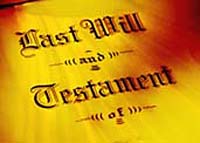 Your first step? Take stock of all your assets. These include your investments, retirement accounts, insurance policies, real estate and any business interests.
Your first step? Take stock of all your assets. These include your investments, retirement accounts, insurance policies, real estate and any business interests.
According to CNN Money's "Identifying your assets" (i.e., part of its Money Essentials Series), a good first step for estate planning is to review and inventory all of your assets. This includes your investments, pensions, retirement accounts, life insurance policies, real estate, and businesses. While you are at it, be sure to categorize your important papers, like birth and marriage certificates, Social Security cards, insurance policy numbers and current statements, and mortgage information, along with updated contact information for each.
The second step is to determine what you want to accomplish with those assets—do you want to pass them to your children, set up a trust for a favorite charity, or a combination of these? Maybe you want to go in a different direction all together.
 Houston Estate Planning and Elder Law Attorney Blog
Houston Estate Planning and Elder Law Attorney Blog










